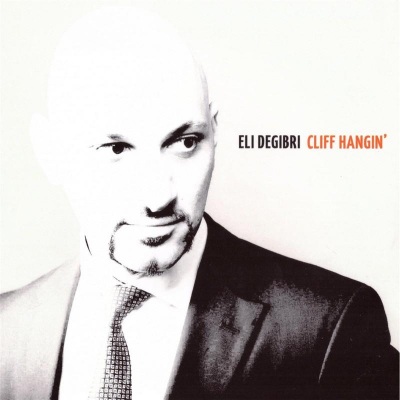
Cliff Hangin'
You need guts when you’ve not yet reached twenty years of age and aim to become a jazz musician sharing the stage with those who wrote some of the most important pages in the history of this music. You most assuredly need guts, but you also need talent in order for such seasoned musicians to put their trust in you. In an art where oral tradition goes hand in hand with apprenticeship, being invited into a group conducted by a more experienced musician is a kind of validation, but also a baptism by fire. This is what happened to Eli Degibri when, at the age of 19, only a few months after graduating from the Thelonious Monk Institute, he was hired by Herbie Hancock for a worldwide tour, and again three years later, when drummer Al Foster, a sideman with Miles Davis and Joe Henderson, took the new tenor under his wing and ended up keeping him in his quintet for nearly a decade. This is how jazz is really learned, on the proving ground of the stage and by contact—which may sometimes be rough—with those to whom the music was passed down by its creators. Even though Eli Degibri has not yet turned forty himself, the time has arrived for him to become part of this chain and transmit some of his own experience to musicians hardly older than he was when he was picked out by Herbie Hancock. This is one of the reasons he’s been leading this particular band since he returned to Tel Aviv after fifteen years in the United States. It has brought forth two musicians, whose talent is undeniable and destined to shine for a long time: pianist Gadi Lehavi (born in 1996) and drummer Ofri Nehemya (born in 1994). The Land of Israel has turned out to be particularly fertile for jazz since such pioneers as Avishai Cohen, Omer Avital and Eli Degibri himself blazed the trail. It appears that the flowering of gifted Israeli musicians has not stopped, nor has the enthusiasm of its youth subsided for a musical language that might have seemed somewhat removed from it, yet has become a vital vehicle of expression. Since he spent over ten years frequently hanging and playing with some of the most important musicians of the New York scene, such as Brad Mehldau, Kurt Rosenwinkel or Jeff Ballard, Eli Degibri is evidently a landmark figure for those young musicians. But Eli would not have wished to form a quartet or to record a new album with them had he not sensed in them the spark distinguishing future great musicians from simply gifted instrumentalists. Degibri also knew that he could count on support from Barak Mori on double bass, who too tried his hand (successfully) at experiencing the American adventure. This album is the fruit of labor by a genuine group. You can hear it in the intensity of the interpretations of the leader's compositions invested by his partners, who display youthful ardor but also an obvious ease with jazz which they handle with the greatest naturalness. But the one who confirms that he ranks among the major tenors, and who stands out from the crowd loud and clear, is Eli Degibri himself, continuously affirming his breathtaking mastery and swirling lyricism which turns everything upside down as it goes by. In this purportedly well-defined quartet format, with an authority that tolerates no contradiction Degibri imposes an energetic, swift style that risks all and never approaches matters halfway, appearing to be free of instrumental constraints. Pushing the limits, he numbers among those saxophone players whose style is constantly on the edge, for whom every chorus is played out as if it were the last. Having written material for this album that plays with rhythmical patterns and returns to the basics, most notably the blues, Eli Degibri offers up compositions that are as playful as they are evocative, showing in the up-tempo passages an impression of confidence commanding respect. It is rare in our time to hear a tenor that makes use of such a large expressive range: alternately sharp and mellow, funky or caressing, sometimes on the verge of bursting with the urgency of his playing. Resolutely attached to melody, to the point of once again inviting singer Shlomo Ydov to record with him, Degibri reveals (on the lesser-heard soprano sax) precision in his lines that hits home. To have seen Eli Degibri in action once is enough to know how much he contrasts with the man he is off-stage. Once the saxophone enters his mouth, this serious, sober, calm and quiet man reveals himself animated with an unpredictable urgency. He is not the first among the great jazz saxophonists to present such a disparity in regard to his temperament, which makes his performances stunning, as music seems to be running through his body. That contrast is a sign that playing music is not a simple exercise for the saxophonist but a true commitment at all times. The title Cliff Hangin' could not better capture this vertigo that holds all jazzmen in suspense, hanging above a void from the moment they start playing, providing the thrill of the music they let us hear. At the age of 37, just like at 19, Eli Degibri has neither given up offering himself this thrill nor passing it along to us. Vincent Bessières
